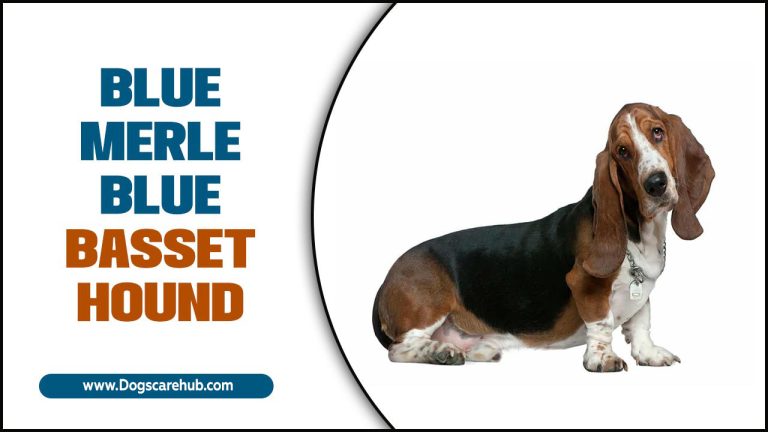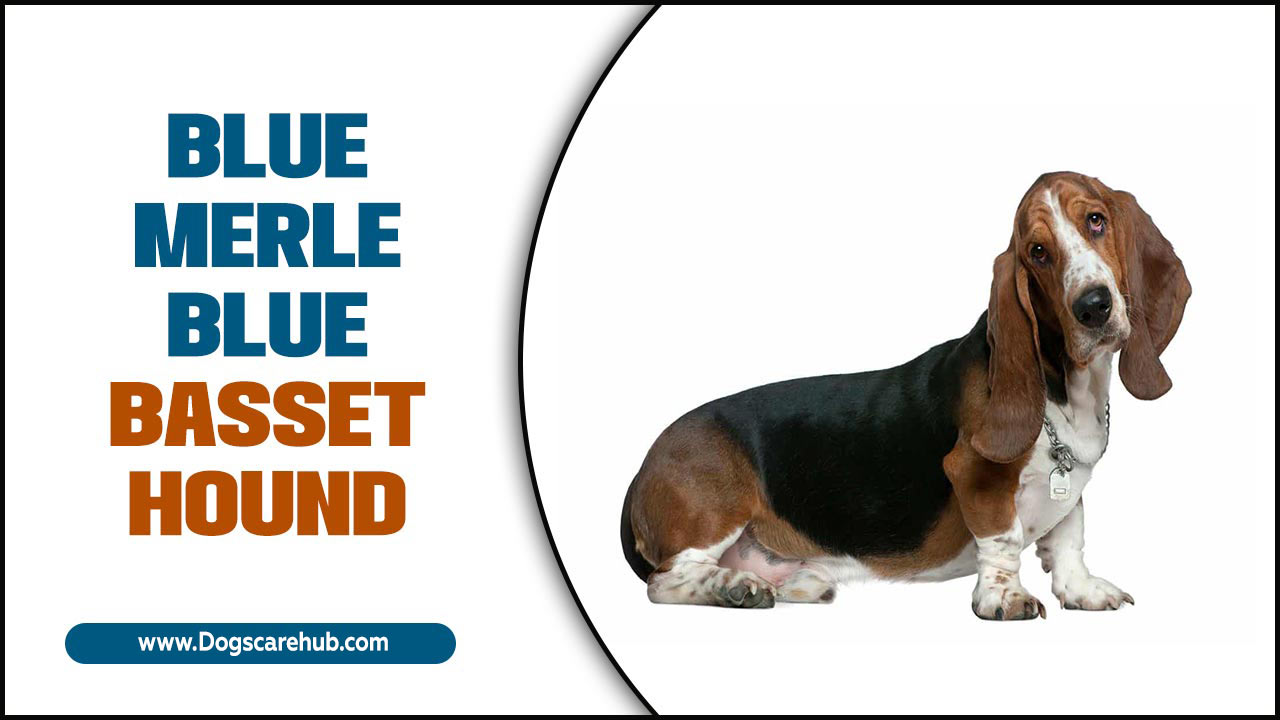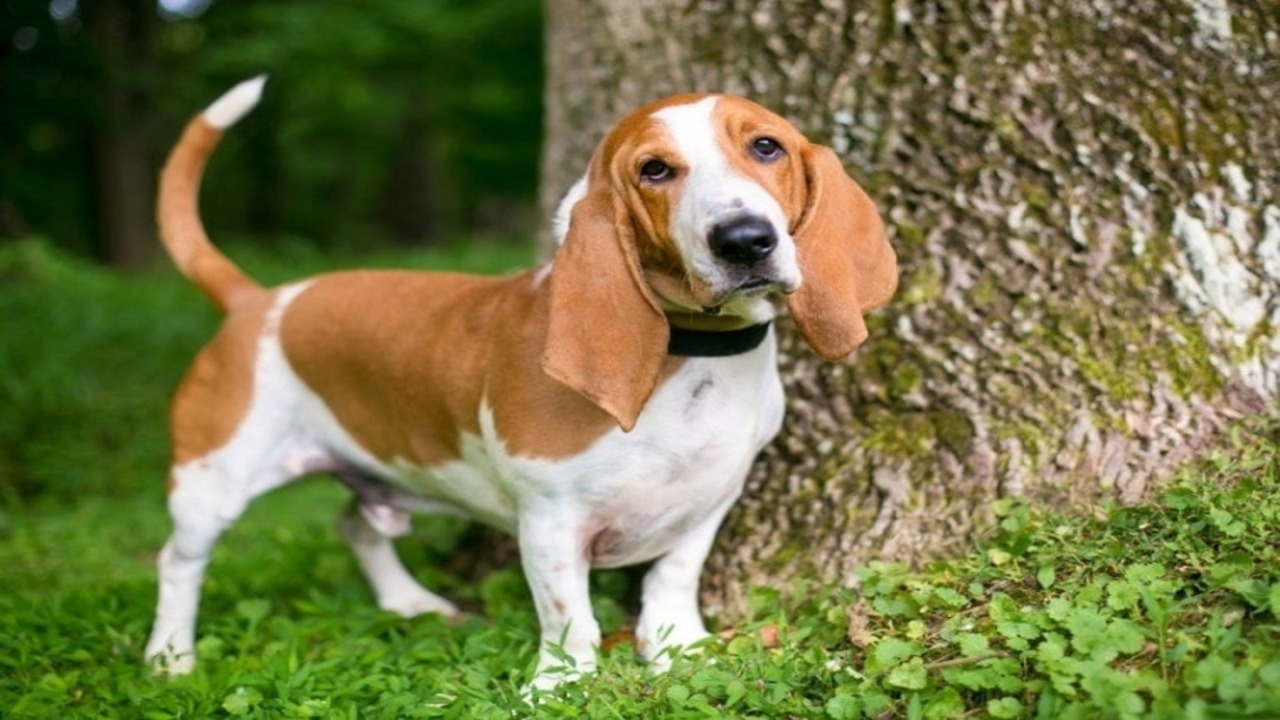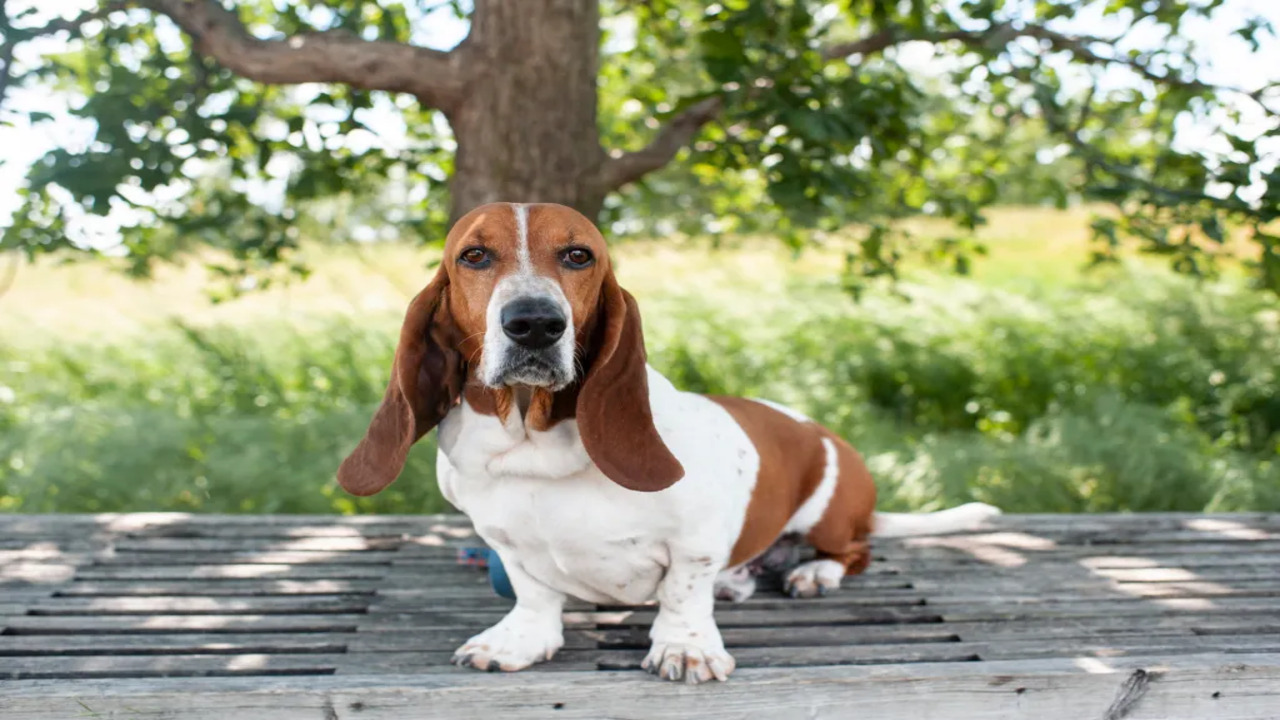
If you’re considering adding a furry friend to your family, you may want to consider a blue merle blue basset hound. These unique dogs are known for their striking coat pattern and gentle temperament.
However, owning any dog requires a great deal of responsibility and commitment. To ensure a happy and healthy life for your blue merle blue basset hound, it’s important to understand their specific needs and quirks. Will provide you with valuable information and insights to make your journey as a blue merle blue basset owner a success.
This guide covers all the essentials, from the basics of breed characteristics and personality traits to training and grooming tips. You’ll learn about the importance of socialization, exercise, proper nutrition, and common health issues to watch out for.

What Is A Blue Merle Blue Basset Hound?

A blue merle blue basset hound is a unique and rare variation of the traditional breed. The term “blue merle” refers to the coat color pattern, consisting of black, gray, and white patches. This coloring is caused by a dilution gene that affects pigment distribution in the dog’s fur.
Blue merle blue basset hounds are known for their striking and eye-catching appearance, speckled coats and soulful eyes. Despite their distinctive look, these dogs still possess all the lovable traits of a typical basset hound, including their friendly and affectionate nature. If you’re lucky enough to own a blue merle blue basset , you’ll have a truly one-of-a-kind companion to share your life with.
Origin And History Of The Breed

The blue merle basset mix is a unique and eye-catching breed that has a fascinating history. Basset Hounds, the ancestors of this mix, were originally bred in France and Belgium. The word “basset” is French for “low,” which accurately describes their short legs and long bodies. It is believed that the Abbey of St.
Hubert friars played a significant role in developing the breed by crossing strains of old European scent hounds. Over time, the basset hound’s distinctive features and incredible sense of smell made them popular hunting dogs. Today, the blue merle basset mix combines these traits with a striking blue merle coat pattern, making them an increasingly sought-after and beloved breed among dog enthusiasts.
Characteristics Of Blue Merle Blue Basset Hounds

Blue Merle Blue Basset Hounds possess distinct characteristics that set them apart. With their medium-sized stature, these dogs showcase a one-of-a-kind blue merle coat color and markings. Known for their sturdy build, low-set bodies, long ears, and droopy eyes, they embody the classic basset hound features. Beyond their physical appearance, these hounds are beloved for their friendly and loyal nature, making them ideal companions for individuals and families.
- They are patient and good with children, making them ideal family pets.
- This breed is also intelligent and easy to train, although they can sometimes be stubborn.
- Bassets are prone to health problems like obesity, hip dysplasia, and ear infections.
Appearance And Physical Traits
A blue merle basset mix is a unique and eye-catching breed that combines the distinctive traits of both the basset hound and the blue merle coloring. These dogs typically have the short legs and long, floppy ears of a basset hound, along with a medium to large-sized body.
The most striking feature of a blue merle basset mix is its beautiful coat, characterized by a marbled pattern of blue-gray, black, and white patches. This coloration gives them a truly unique and stunning appearance. In addition to their physical traits, these dogs are known for their friendly and laid-back temperament, making them wonderful companions for families and individuals.
Personality And Temperament
Blue Merle Blue Basset Hounds are beloved for their friendly and affectionate nature. These social dogs thrive in the company of their favorite humans and family members. They have a calm and laid-back temperament yet can be playful and energetic when the occasion demands it.
Blue Merle Blue Basset Hounds get along well with children and other pets, making them a great addition to any family. Their loyalty and devotion to their owners is unparalleled, ensuring a deep bond between dog and human. With their amiable personality and gentle demeanor, Blue Merle Blue Basset Hounds make for wonderful companions in any home.
Caring For A Blue Merle Blue Basset Hound

Providing a nutritious diet is crucial to maintain the health of Blue Merle Blue Basset Hounds. Regular exercise is necessary to keep them physically and mentally stimulated. Although their grooming needs are relatively low, regular brushing helps maintain their coat’s condition.
While generally healthy, regular veterinary check-ups are important for monitoring their overall well-being. Considering pet insurance can help safeguard against unexpected medical expenses. By prioritizing a balanced diet, regular exercise, grooming, and veterinary care, you can ensure that your Blue Merle Blue Basset remains happy and healthy for years.
Dietary Needs
Regarding the dietary needs of Blue Merle Blue Basset Hounds, high-quality dog food that meets their specific nutritional requirements is essential. A balanced diet that includes protein, carbohydrates, vitamins, and minerals should be provided to ensure their overall health and well-being.
It is recommended to feed them twice a day and closely monitor their weight to prevent obesity. Additionally, always make sure that fresh water is readily available for them to stay hydrated. If you have any concerns or questions regarding their diet, consulting with a veterinarian can help determine the most appropriate and beneficial diet for your Blue Merle Blue Basset Hound.
Exercise Requirements
Blue Merle Blue Basset Hounds have moderate exercise needs, enjoying daily walks or play sessions. Ensuring mental stimulation through puzzle toys or training activities is also beneficial. Regular exercise is crucial to maintain a healthy weight, as they tend to become overweight.
These dogs also thrive when participating in agility or obedience training. However, avoiding overexertion, especially in hot weather, is important due to their low stamina. You can help keep your Blue Merle Blue Basset Hound happy, healthy, and well-balanced by providing appropriate exercise and mental stimulation.
Grooming Tips
Keeping your Blue Merle Blue Basset Hound’s coat looking neat is easy with a few grooming tips. Their short, dense coat requires minimal maintenance, but regular brushing will help remove any loose hair and keep their coat healthy. When bathing, use a dog-friendly shampoo and conditioner as needed.
Don’t forget to check and clean their ears regularly to prevent infections. Nail trimming and dental care are important aspects of overall grooming for your Blue Merle Blue Basset Hound. By following these tips, you can ensure that your furry companion looks and feels their best.
Health Concerns In Blue Merle Blue Basset Hounds

Like any breed, Blue Merle Blue Basset Hounds can be prone to certain health issues. However, they are generally healthy dogs. Hip dysplasia, ear infections, and obesity are common concerns in this breed. Regular veterinary check-ups, vaccinations, and parasite control are essential for maintaining their health.
Detecting and treating any health issues early on can ensure a long and happy life for your Blue Merle Blue Basset . Consulting a reputable breeder and obtaining a health certificate can help minimize the risk of hereditary health problems. Your Blue Merle Blue Basset can thrive with proper care and attention.
Common Health Issues
Blue Merle Blue Basset Hounds may be prone to a few common health issues. One of these is hip dysplasia, which can cause pain and mobility problems due to improper hip joint development. Another concern is ear infections, as their floppy ears make them more susceptible. Regular cleaning and proper ear care can help prevent these infections.
Additionally, Blue Merle Blue Basset are prone to obesity, so maintaining a balanced diet and providing regular exercise is crucial in preventing weight gain. Regular veterinary check-ups and preventive care are also important for identifying and addressing potential health issues early on. Dog owners should be aware of these common health issues and take appropriate measures to ensure the well-being of their beloved pets.
Genetics Of The Blue Merle Coat
The Blue Merle coat color is a rare and unique trait found in Basset Hounds. It is the result of a genetic mutation that affects the production of pigment in the hair follicles. This mutation gives the coat a striking blue-marbled appearance, making Blue Merle Basset Hounds highly sought after by dog enthusiasts.
However, it’s important to note that this coat color can come with certain health risks. Blue Merle Basset Hounds may have a higher predisposition to deafness or blindness, which can be attributed to the same genetics that gives them their beautiful coat. Therefore, potential owners should research and find a reputable breeder who prioritizes the health and well-being of their dogs.
Training Your Blue Merle Blue Basset Hound
Training your blue merle blue basset hound is essential for establishing good habits and behaviors. To begin, start training your pup as early as possible. Use positive reinforcement, such as treats, toys, and praise, to reward good behavior and encourage them to repeat it. Consistency is key in their training, so establish a routine and rules.
Additionally, socialization is important for their development. Expose your blue merle blue basset to different people, animals, and environments to help them become well-adjusted and comfortable in various situations. If you’re struggling with training or facing specific behavioral issues, consider seeking professional help from a trainer or behaviorist.
Basic Commands And House Training

Teaching your blue merle basset mix basic commands like sit, stay, and come is essential for effective communication. Positive reinforcement, such as treats and praise, will help house-train your pup. Consistency and patience are key in successfully establishing good behavior.
During house training, create a routine for feeding and bathroom breaks to reinforce desired habits. Reward your dog with treats and praise for following commands and exhibiting appropriate behavior. Incorporating these training techniques ensures that your blue merle basset mix becomes a well-behaved and obedient pet.
Dealing With Behavioral Issues
It is important to utilize positive reinforcement training techniques to address behavioral issues in your blue merle basset mix. This involves rewarding good behavior with treats, toys, and praise to encourage your dog to repeat the desired behavior.
If you are struggling with behavior problems, consulting a professional dog trainer can provide valuable guidance and support. Another crucial aspect is preventing unwanted behaviors through proper socialization and training from an early age.
By exposing your dog to different environments, people, and animals, you can help them become well-adjusted and comfortable in various situations. It is essential to approach correcting behavioral issues with patience and consistency, understanding that each dog is unique and requires individualized training.
Before attempting to correct any behavior, it is crucial to understand the underlying cause of the behavior itself. By addressing the root cause, you can effectively modify and correct the behavior.
Living With A Blue Merle Blue Basset Hound
Provide a spacious and secure home environment for your blue basset hound to ensure its comfort and safety. These active and engaging dogs thrive in homes that can provide them with plenty of space to roam and play. Consider the compatibility of a blue basset hound with your family’s schedule and energy level, as they require regular exercise to prevent boredom and destructive behavior.
It is important to ensure that your blue basset hound receives proper veterinary care and nutrition to maintain their overall health and well-being. Providing a loving and nurturing environment can create a happy and fulfilling life for your blue merle blue basset .
The Ideal Home
When providing an ideal home for a blue basset hound, there are a few key factors to remember. First and foremost, these dogs need a home with a secure yard where they can exercise and play safely. Blue basset hounds are adaptable and can live in various living situations, so whether you have a small apartment or a spacious house, they can easily fit into your lifestyle.
However, it’s important to consider the size of your home and the space available for a blue basset hound. Providing a comfortable and safe indoor space is also crucial, as these dogs thrive when they have their designated area in the house. Lastly, ensure your home is free of hazards that could harm your blue basset hound. Creating a loving and secure environment ensures that your blue basset hound is happy and thriving in their new home.
Compatibility With Kids And Other Pets

Blue basset hounds can be gentle and patient with children, making them suitable for families. However, proper socialization is crucial when introducing a blue basset hound to other pets. It’s important to supervise interactions between the blue basset hound and young children or small animals to ensure everyone’s safety.
Teaching children how to interact with the dog properly is also essential to prevent any accidents. Additionally, it’s important to consider your current pets’ temperament and energy level before introducing a blue basset hound into your home. Taking these factors into account will help foster a harmonious environment for all members of the household.
How To Choose A Blue Merle Blue Basset Hound Puppy?
Choosing a Blue Merle Blue Basset Hound puppy can be exciting and rewarding. When selecting a puppy, there are several factors to consider. First, finding a reputable breeder who specializes in Blue Merle Basset Hounds and has a good reputation for producing healthy and well-tempered puppies is important.
Next, take the time to meet the puppies and their parents, if possible, to assess their temperament and health. Look for puppies that are curious, alert, and friendly. Additionally, consider the puppy’s physical characteristics and choose one that meets your preferences regarding size, coat color, and markings.
Finally, ensure you are prepared to provide the necessary care and attention required by a Blue Merle Blue Basset puppy. With careful consideration and research, you can find the perfect Blue Merle Basset Hound puppy to join your family.
Conclusion
Owning a Blue Merle Blue Basset Hound can be a wonderful experience for any dog lover. These unique and beautiful dogs have their own characteristics and care needs that require attention and understanding. From their appearance to their temperament, it’s important to know what to expect when bringing a Blue Merle Blue Basset into your home.
Caring for them involves a balanced diet, regular exercise, and proper grooming. Awareness of any potential health concerns affecting this specific breed is also crucial. Training and socialization are key factors in raising a well-behaved Blue Merle Blue Basset Hound, and finding the right puppy or considering adoption requires careful research and consideration.
Frequently Asked Questions
1.Are Basset Hound Mixes Good Dogs?
Ans: Basset Hound mixes can be wonderful pets, but they vary depending on the breed mix. Some popular mixes include Bassador (Basset Hound-Labrador), Bassador (Basset Hound-Boston Terrier), and Bagle Hound (Basset Hound-Beagle). It’s important to research the temperament and needs of both breeds in the mix. Adopting from a reputable rescue or shelter can ensure a well-behaved and healthy dog.
2.Is A Basset Hound Rare?
Ans: Basset Hounds are not considered rare, but the blue merle color variation is less common. These unique dogs look striking, and finding reputable breeders may be more challenging. However, adopting a Basset Hound from a shelter or rescue organization is also a great option.
3.Are Blue Basset Hounds Healthy?
Ans: Blue basset hounds can be healthy if bred responsibly and undergo regular health checkups. Health issues like hip dysplasia, ear infections, and obesity may affect them. Research the breeder, ask for health clearances, and provide exercise, a balanced diet, and preventative care to keep them healthy.
4.What Does A Blue Basset Hound Look Like?
Ans: A blue basset hound has a unique coat pattern with shades of gray, black, and white. This pattern can be found in both smooth and long-haired varieties. Blue bassets have floppy ears, long bodies, and short legs. However, it’s important to note that all kennel clubs may not recognize the blue color as a standard color for the breed.
5.Are There Any Health Concerns Specific To The Breed?
Ans: Blue merle basset hounds, like all breeds, may have certain health issues. These include hip dysplasia, ear infections, and obesity. Responsible breeders perform health screenings on their dogs and provide health guarantees. Regular vet check-ups, a balanced diet, and exercise can help prevent or manage potential health problems.
Meet Elyse Colburn, the devoted canine companion and storyteller behind the enchanting world of “Tales, Tails, and Adventures Unleashed.” A passionate dog enthusiast with a heart full of paw prints, Elyse Colburn shares heartwarming tales and insightful adventures, celebrating the joy, loyalty, and endless antics that make every dog a true hero. Join Elyse Colburn on this tail-wagging journey, where every post is a love letter to our four-legged friends.